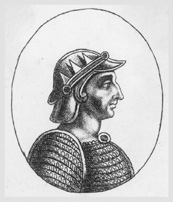The Good, the Bad and the Unready (63 page)
Read The Good, the Bad and the Unready Online
Authors: Robert Easton

Christian II, king of Denmark, Norway and Sweden, 1481–1559
In 1517, when already king of Denmark and Norway, Christian decided to conquer Sweden and become its king. After a couple of military setbacks he won a decisive battle at Bogesund in January 1520 at which Sten Sture, the Swedish regent, was mortally wounded. Christian’s coronation took place in November the same year. Six days of feasting later, the intemperate king then orchestrated an atrocity which will for ever sully his fame.
Despite a solemn and sweeping declaration of amnesty for all who had opposed him, Christian, with the decidedly unchristian archbishop Gustav Trolle at his side, accused Sture’s followers of heresy. Without trial, they were all found guilty; two bishops were dragged to the market-place and beheaded and nearly a hundred nobles and prominent burghers were killed in what became known as ‘the Stockholm Massacre’. The body of Sten Sture was disinterred and, together with those of the recently murdered, thrown on to a pyre and burned. For this outrage
Christian acquired the unwelcome but deserved epithets ‘the Cruel’, ‘the Nero of the North’ and ‘the Tyrant’.
 John the
John the
Tyrant
see
John the
PERFECT
 Edward the
Edward the
Uncle of Europe
see
Edward the
CARESSER
 Arnulfthe
Arnulfthe
Unfortunate
Arnulf III, count of Flanders, 1055–71
Arnulf was unfortunate to grow up in a time when it was the norm for sixteen-year-old boys to fight in battle. Arnulf died, aged sixteen, at the battle of Kassel while fighting against his uncle, ‘Robert the Frisian’.
 Louis the
Louis the
Universal Spider
Louis XI, king of France, 1423–83
With the aid of his assistant ‘Tristan the Gossip’, Louis was a consummate king of spin, creating an elaborate web of international relations and intrigue that trapped unwary politicians and uncertain monarchs into making concessions or agreeing to his harsh demands. The wily John II of Aragon, known for his own political parleying, warned that Louis was ‘the inevitable conqueror in all negotiations’, while the Milanese ambassadors to the French court, men who prided themselves on their diplomatic sophistication, found Louis to be the ‘subtlest man alive’.
Yet, less than a generation after his death, he was remembered not so much for his political mastery as for his cruelty and repression. Legend has it that he delighted in drinking infants’ blood and listening to the screams of people being tortured. More believable were stories of his harsh treatment of his servants who had their ears sliced off for simple acts of dishonesty, and
his ill-treatment of some pigs which he had incorporated into a kind of porcine piano. Pigs of various sizes were attached to a keyboard and when the keys were pressed, spikes would jab the pigs, making them squeal in pain and almost in tune.
Ugly, indiscreet and manipulative, Louis claimed to be a devout Christian and wore a leaden statuette of the Virgin Mary in his hat.
 Ethelred the
Ethelred the
Unready
Ethelred II, king of England, 968–1016
Ethelred was something of a reluctant monarch, and, according to historian Henry of Huntingdon, his reign was destined to be disastrous from the moment he urinated in the font at his baptism.
As every schoolchild knows, he is remembered as ‘the Unready’. Fewer are perhaps aware that the nickname does not refer to any lack of preparation on his part but is instead an ironic play on his name, with
athel
meaning ‘noble’ and
raed
meaning ‘counsel’. ‘Unready’ here means ‘poorly advised’, and by his own admission Ethelred did indeed receive poor guidance. His unsuccessful attempts to defend the country through diplomacy rather than force, his unproductive political marriage to Emma the
GEM OF NORMANDY
and his unpopular levy of a tax called ‘the Danegeld’ to buy off Viking raids, he agreed were all products of woeful counsel.

Ethelred the
Unready
The worst advice Ethelred probably took was to endorse what became known as the St Brice’s Day Massacre on 13 November 1002, when he ordered the killing of every Dane living in England.
Whether this decree was fulfilled to the letter is unclear. What
is
clear is that the event prompted Sven
FORKBEARD
to invade England. By 1013 Sven had been accepted as king and Ethelred had fled to Normandy. Ethelred returned to rule after Sven’s death in 1014, but died himself in 1016, leaving the country to his son Edmund
IRONSIDE
.
 Elizabeth an
Elizabeth an
Untamed Heifer
see
GOOD QUEEN BESS
 Abu Bakr the
Abu Bakr the
Upright
Abu Bakr, Muslim caliph, c.573–634
Abu Bakr – the name itself means ‘the Father of the Maiden’ in reference to his daughter Aisha, whom Muhammad married at an age ‘when she was still playing with dolls’ –was the prophet’s closest friend. Abu Bakr succeeded Muhammad as the first caliph in 632 and began compiling the Qur’an. Such was his earnest holiness during his two-year reign that he earned the title ‘as-Siddiq’, meaning ‘the Truthful’ or ‘the Upright’.
 Osman the
Osman the
Victorious